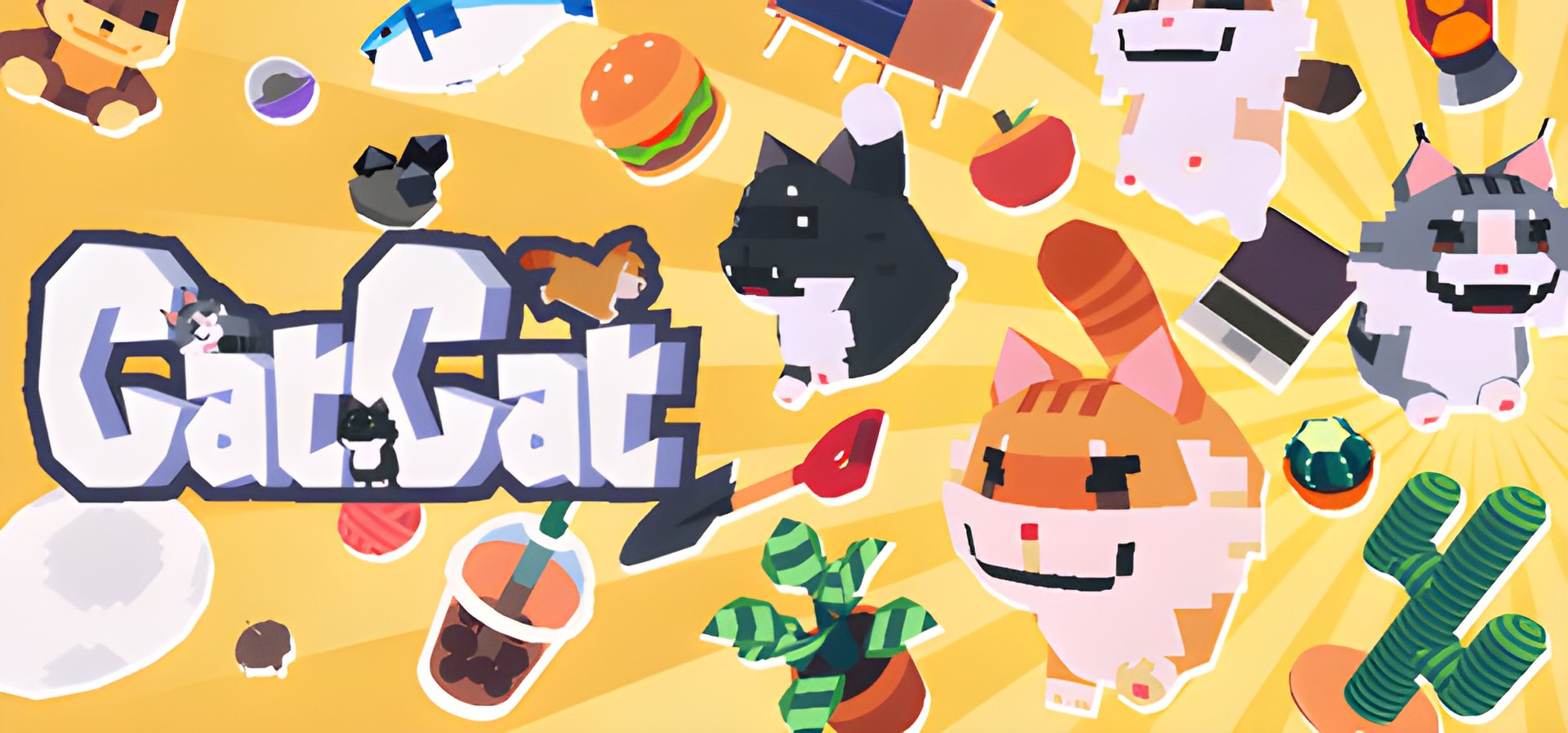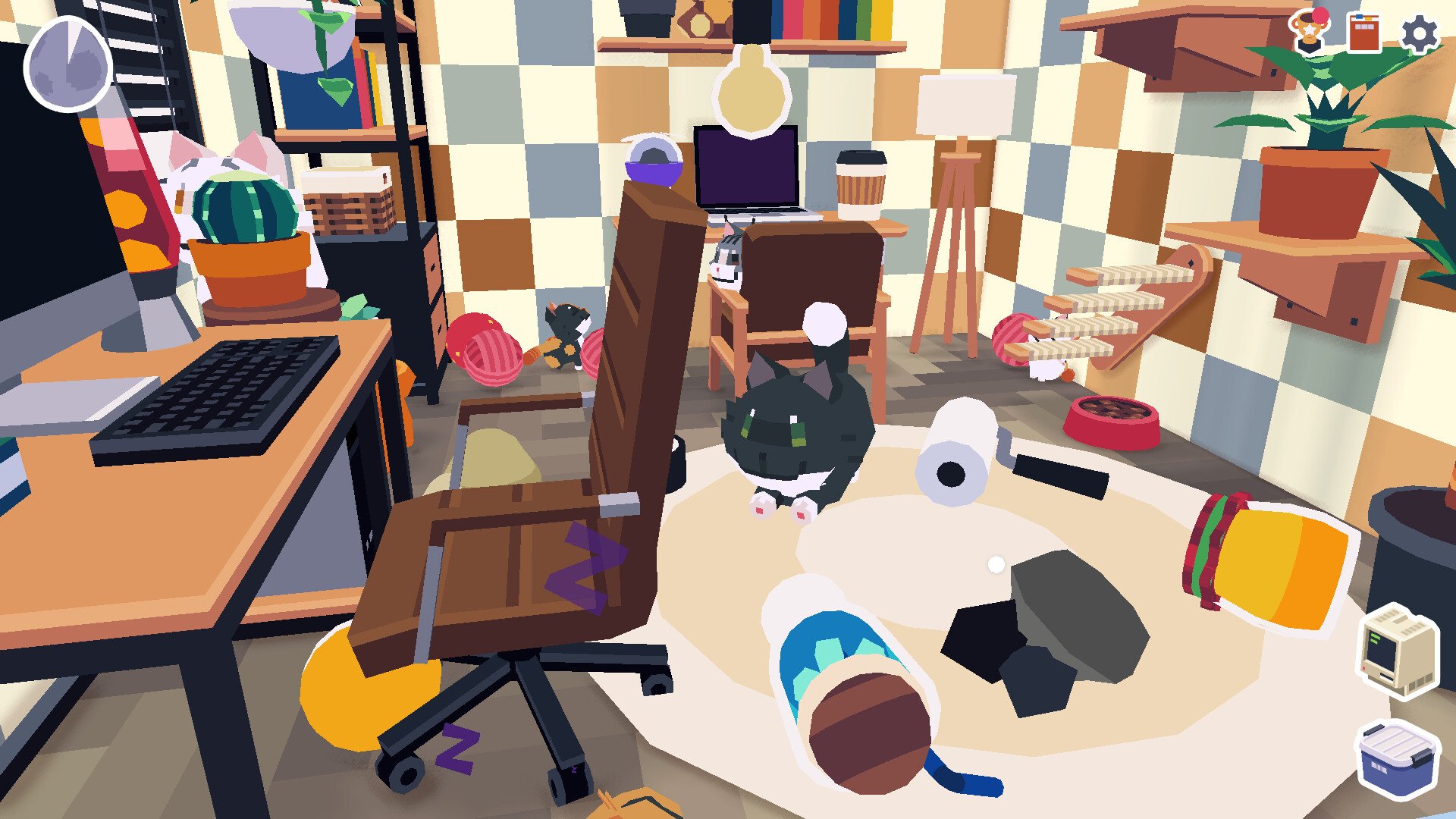The world of virtual pet simulations is about to get a whole lot cuter with CatCat, a relaxing game centered around raising adorable felines. Coming to Steam on September 16, 2025, this simulation game allows you to raise different breeds, customize their living spaces, and simply enjoy their company. If you're seeking a stress-free, creatively engaging experience, CatCat might just be the purrfect addition to your gaming library. Will it become your next obsession, offering endless hours of feline fun?

What is CatCat All About?
CatCat positions itself as a relaxing cat simulation game, setting aside traditional gaming pressures in favor of a peaceful, creative environment. Players can acquire cat eggs and hatch various breeds of cats by interacting with the game world – cleaning up messes or even, humorously, destroying furniture. These kittens require care: feeding and attention will help them grow, leading to unique surprises as they mature. The core gameplay loop revolves around nurturing these virtual pets and creating a comfortable habitat for them.
One of the game's key features is its emphasis on customization. Players have the freedom to design and furnish their cats' living spaces. This involves choosing flooring, arranging furniture, and altering wall colors. By mixing and matching different textures and decorative elements, players can create unique and cozy environments tailored to their feline companions. This level of personalization aims to enhance the sense of connection between the player and their virtual cats, fostering a deeper engagement with the game.
CatCat's target audience primarily consists of players who enjoy simulation games, particularly those with a focus on pets or animals. The game's gentle mechanics and lack of explicit goals make it well-suited for casual gamers seeking a low-pressure experience. Additionally, the customization options and the inherent appeal of cute cats will likely attract a younger audience. Parents looking for age-appropriate and relaxing games for their children may also find CatCat appealing. However, the simple gameplay and limited challenge might not resonate as strongly with hardcore gamers seeking more complex or competitive experiences.
The game distinguishes itself by promising a tranquil and creatively fulfilling experience. Unlike many simulation games that impose objectives or challenges, CatCat encourages players to simply enjoy the process of caring for their virtual pets and designing their surroundings. This design philosophy caters to players who appreciate aesthetic customization and the emotional connection with virtual pets. The developers, bogy house, aim to provide a digital sanctuary where players can unwind and immerse themselves in the simple pleasures of cat companionship. The game's accessibility and focus on relaxation could carve out a niche among simulation titles, attracting players seeking a more laid-back and creatively-driven experience.
Performance Expectations and Value Proposition
Anticipating the performance of CatCat requires considering its system requirements. The game lists modest minimum specifications, including an Intel i3-6100 or equivalent processor, 8 GB of RAM, and a GeForce GTX 670 / Radeon HD 7970 graphics card. These requirements suggest that CatCat should be playable on a wide range of PCs, including older or budget-friendly systems. However, the absence of recommended specifications makes it challenging to gauge how well the game will perform on higher-end hardware. Optimization will be crucial, and players will need to assess the game's performance on their specific configurations upon release. Frame rate stability and responsiveness will be key factors in determining the overall enjoyment of the game, particularly during scenes with numerous cats or intricate room designs.
Evaluating the value proposition of CatCat hinges on its pricing and the depth of its content. Currently, the game's price is unknown. However, given its classification as a casual simulation title, it's likely to be positioned within the budget-friendly range. The value will then depend on the number of cat breeds available, the variety of furniture and customization options, and the overall replayability of the game. If CatCat offers a substantial amount of content and regular updates, it could represent good value for money, particularly for players who enjoy collecting and customizing virtual pets. However, if the content feels limited or repetitive, the game's value may diminish quickly.
Compared to other cat simulation games, CatCat appears to be targeting a more relaxed and less demanding gameplay experience. Titles like Neko Atsume offer simple cat-collecting mechanics, while games like Cat Cafe Manager incorporate business simulation elements. CatCat seems to fall somewhere in between, prioritizing customization and aesthetic appeal over complex gameplay systems. This approach could differentiate CatCat from its competitors, attracting players who prefer a gentler and more creatively focused experience. The game's success will depend on delivering a polished and engaging simulation that resonates with its target audience. Community feedback and post-launch support will also play a significant role in shaping the game's long-term value.
Ultimately, the value of CatCat will be determined by the player's individual preferences. Those seeking a deep and challenging simulation experience may find the game lacking. However, players who appreciate the simple pleasures of cat companionship and the freedom to express their creativity through customization may find CatCat to be a worthwhile addition to their Steam library. Careful consideration of the game's content, performance, and price will be essential in making an informed purchasing decision.

Contextual Analysis and Long-Term Appeal
The upcoming release of CatCat taps into the enduring popularity of cat-themed games and simulation experiences. The gaming market is replete with titles featuring felines, ranging from action-adventure games like Stray to casual simulators such as Neko Atsume. CatCat distinguishes itself by placing emphasis on the relaxing aspects of cat ownership and the creative possibilities of interior design. This approach resonates with a broad audience, including casual gamers, pet lovers, and individuals seeking a calming and aesthetically pleasing gaming experience. By combining these elements, CatCat has the potential to carve out a niche in the crowded simulation market.
CatCat's long-term appeal hinges on several factors, including the availability of post-launch content, the strength of its community, and the replayability of its core mechanics. Regular updates introducing new cat breeds, furniture items, and customization options would help keep the game fresh and engaging for existing players. The developers could also introduce seasonal events or challenges to provide ongoing incentives for players to return to the game. Building a strong community around CatCat would foster a sense of shared enthusiasm and encourage players to share their creations and experiences. Mod support, if implemented, could further extend the game's lifespan by allowing players to create and share their own content.
Analyzing the game's contextual relevance involves considering its position within the broader gaming landscape. The simulation genre has experienced steady growth in recent years, driven by the increasing demand for relaxing, creative, and personalized gaming experiences. CatCat aligns with this trend by offering players the opportunity to create their own virtual cat villages and express their creativity through interior design. The game's accessible mechanics and gentle pace make it suitable for players of all ages and skill levels, further broadening its potential reach. By capitalizing on the enduring appeal of cats and the growing popularity of simulation games, CatCat has the potential to achieve lasting success.
The developers' commitment to post-launch support and community engagement will be crucial in determining CatCat's long-term viability. Active communication with players, responsiveness to feedback, and a steady stream of new content would help maintain player interest and encourage ongoing participation. If the developers can cultivate a vibrant and supportive community, CatCat has the potential to become a beloved and enduring title in the simulation genre. Careful planning and execution will be essential in ensuring that CatCat fulfills its promise as a relaxing and creatively fulfilling gaming experience.
Final Thoughts on CatCat
CatCat presents itself as a charming and relaxing cat simulation game, poised to offer a tranquil escape for players seeking a creative outlet and the simple pleasures of virtual pet ownership. With its emphasis on customization, gentle mechanics, and adorable felines, the game aims to provide a low-pressure environment where players can unwind and express their artistic sensibilities. While the game's long-term appeal depends on post-launch support and community engagement, CatCat has the potential to carve out a niche in the crowded simulation market.
If you're a fan of simulation games, particularly those with a focus on pets or animals, CatCat is definitely worth keeping an eye on. Its accessible mechanics and emphasis on relaxation make it a great choice for casual gamers seeking a calming and creatively fulfilling experience. However, if you're seeking a deep and challenging simulation with complex gameplay systems, CatCat might not be the right fit. Ultimately, the decision to add CatCat to your Steam library will depend on your individual preferences and gaming style. Consider the game's content, performance expectations, and price before making your final decision.
Pros & Cons
✅ Pros
- Relaxing and stress-free gameplay experience
- Extensive customization options for rooms and cats
- Adorable cat breeds to collect and care for
- Accessible mechanics suitable for all ages
- Potential for post-launch content and community engagement
❌ Cons
- Lack of challenging gameplay or complex systems
- Unknown pricing and content depth at launch
- Dependence on post-launch support for long-term appeal
- Limited information available prior to release
- May not appeal to hardcore simulation gamers